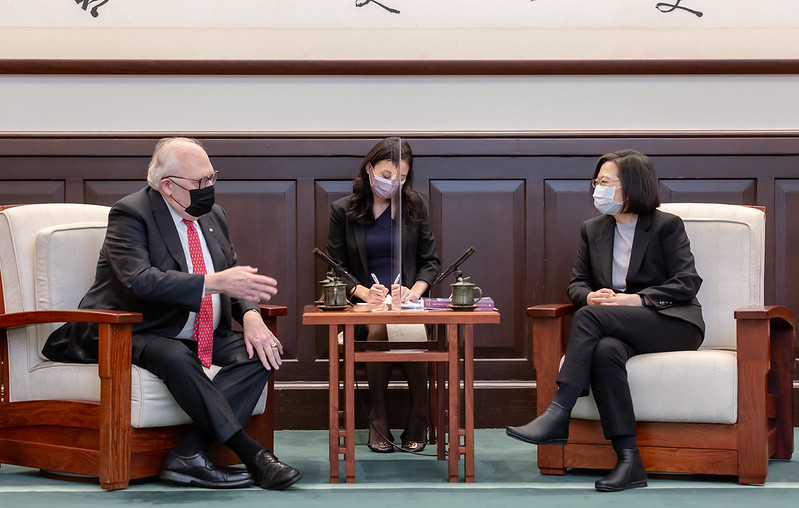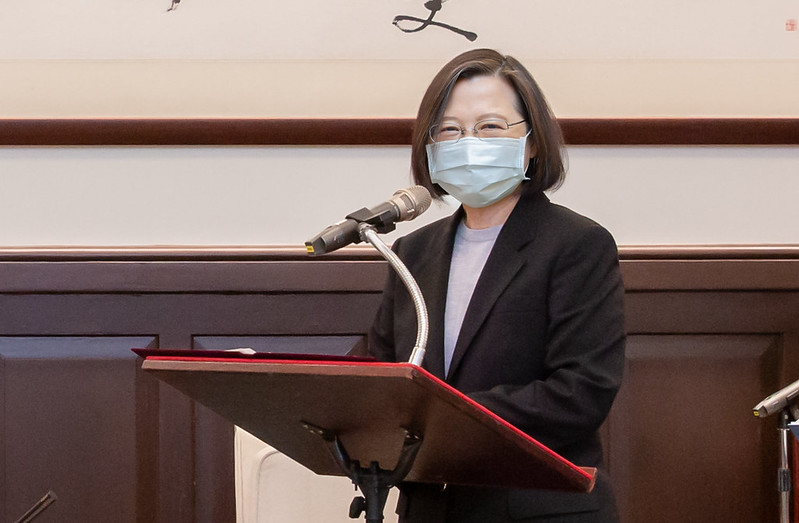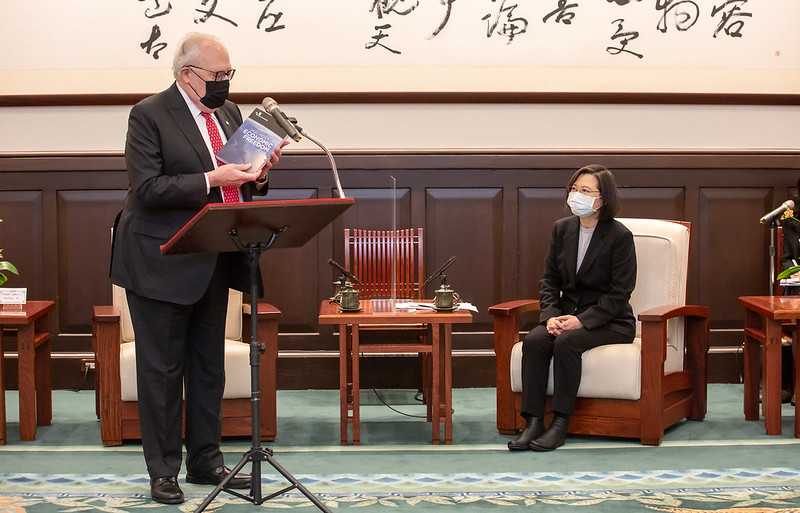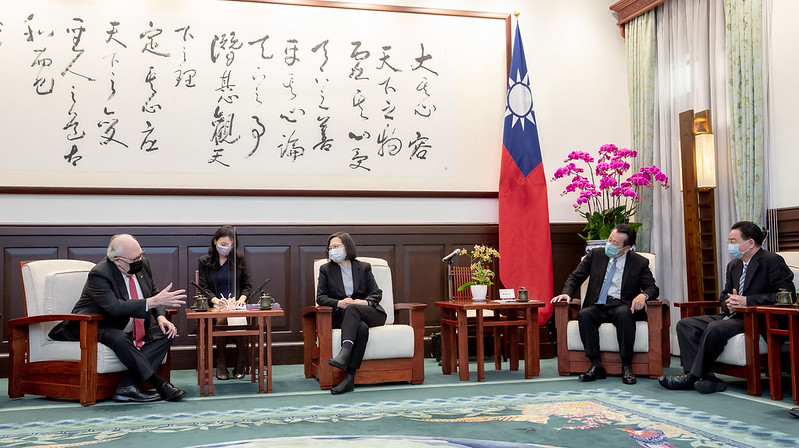News & activities
 News releases
News releases
On the afternoon of February 15, President Tsai Ing-wen met with Dr. Edwin Feulner, founder and former president of the Heritage Foundation. During the meeting, President Tsai noted that the Heritage Foundation had once again ranked Taiwan sixth in its Index of Economic Freedom, and highlighted Taiwan's desire to engage more actively in regional economic integration, as part of which we are seeking to join the CPTPP. The president said she looks forward to the continued support of Dr. Feulner and the Heritage Foundation in further strengthening Taiwan-US relations, including by opening talks on a free trade agreement and a digital economy agreement.
A translation of President Tsai's remarks follows:
Today is Lantern Festival, which is a traditional time for friends and families to gather together at the start of the Lunar New Year. On this special day, I am very glad to reunite with my old friend Dr. Feulner. Dr. Feulner is a close and longtime friend of Taiwan, having made more than 100 visits to our shores. I myself have had many exchanges with him since I took office.
In 2019, we met twice at the Presidential Office. But because of the pandemic, it has been a while since your last visit. In addition to welcoming you and Mr. [Anthony] Kim, research fellow and editor of the Index of Economic Freedom, I would like to express my gratitude to you and the Heritage Foundation for your long-term support for stronger Taiwan-US relations. The Heritage Foundation works to promote democracy and free markets, values that are central to Taiwan's development.
In last year's referendum the Taiwanese people clearly expressed their determination to engage with the international community. We recently relaxed restrictions on Japanese food imports, once again showing that Taiwan is willing to accept international standards and tackle difficult trade issues. Indeed, Taiwan is prepared to meet the high standards of the international trading system.
We noted that the Heritage Foundation's 2022 Index of Economic Freedom, released just yesterday, once again ranked Taiwan sixth in the world. In the Asia-Pacific region, we are behind only Singapore and New Zealand. The ranking is a recognition of Taiwan's efforts and achievements in creating a free, open, and fair economic environment. As a member of multilateral trade organizations such as the WTO and APEC, Taiwan hopes to further participate in regional economic integration, which is why we are applying to join the Comprehensive and Progressive Agreement for Trans-Pacific Partnership (CPTPP).
Taiwan will keep working with our democratic partners around the world to expand cooperation across a broad range of fields. We hope that Dr. Feulner and the Heritage Foundation will continue to advocate for strengthening Taiwan-US ties, including by starting talks on a free trade agreement and a digital economy agreement.
Recently, the expansion of authoritarianism around the world has become a focus of international attention. Dr. Feulner, since your first visit over 40 years ago, you have witnessed Taiwan's democratic transformation, and have gained a firm understanding of the Taiwanese people's commitment to democracy and freedom. Taiwan will continue to be on the front line in defending democracy, and we will cooperate with the United States and other like-minded nations to safeguard peace and stability in the Indo-Pacific region and protect democracy and human rights.
With the arrival of the new year, we hope to see Taiwan-US cooperation continue to bear new fruit. Thank you both for taking time out of your busy itinerary in Asia to come to Taiwan. Your visit shows how much you value our friendship. I wish you every success on your travels and a very happy Year of the Tiger.
Dr. Feulner then delivered remarks, pointing out that for the past 27 years, the Heritage Foundation has published an annual Index of Economic Freedom, and noting that, since the first edition of the report, when Taiwan placed around 27th globally, its ranking has steadily risen over the past five years, an inspiring accomplishment.
Dr. Feulner further noted that the highest ranking for a country in the Index of Economic Freedom is "free," a ranking that Taiwan attained for the first time this year, placing sixth among seven "free" countries from around the world.
Dr. Feulner said that over the past 40 years, Taiwan and the United States have built a very close and special relationship on the foundation of the Taiwan Relations Act, and recalled that the act was first passed with strong bipartisan support and signed into law by then-President Jimmy Carter. Dr. Feulner observed that bipartisan support in the US for Taiwan continues to this day, both in Congress and the administration, and that it is the belief of the American people and their elected representatives that the United States should maintain a strong relationship with Taiwan because of the very positive things that Taiwan represents.
Dr. Feulner noted that the Index of Economic Freedom shows not just Taiwan's commitment to developing a free economy, but also its commitment to a free people and independent institutions, which together make Taiwan an example for Asia and the world in terms of how a developing country can move progressively into new chapters of development.
Dr. Feulner further affirmed that Taiwan is a critically important ally, friend, and cornerstone of the US's relationship with the Indo-Pacific, and pointed out that in addition to economic freedom itself, the Index of Economic Freedom measures the rule of law, transparency, and the role that people play, by which standards we can see how much progress Taiwan continues to make.
Dr. Feulner echoed President Tsai's call for institutional collaboration between Taiwan and the US toward a free trade agreement and a digital economy agreement, and highlighted the importance of strengthening the bilateral relationship.






